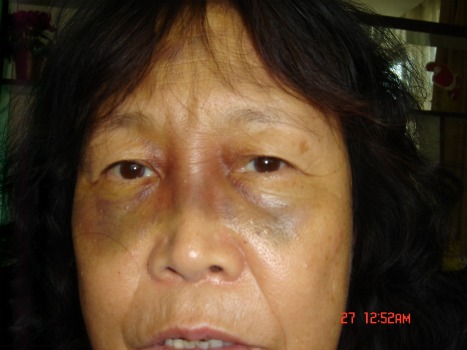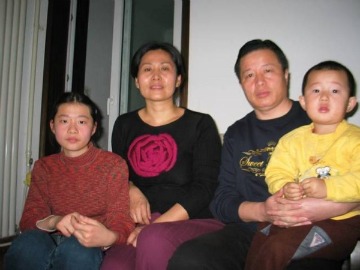| Reporters Without Borders |
| October 3, 2011 |
| New York |
Reporters Without Borders is shocked to learn that the writer, human rights activist and cyber-dissident Govruud Huuchinhuu is often beaten by police in Tongliao (通辽, in Inner Mongolia), where she is reportedly under house arrest. This is the first news of Huuchinhuu since 27 January, when she left the Tongliao hospital where she had been treated for cancer.
“We call for a full investigation into this case,” Reporters Without Borders said. “Those responsible for this violence must be punished and Huuchinhuu must be granted a proper release. We also call on the government to stop the use of enforced disappearance and house arrest for persons it claims to have released.”
The information about Huuchinhuu was provided by the Southern Mongolian Human Rights Information Centre (SMHRIC), which received photos and documents dating back to 20-30 July showing that she had been beaten several times by police officers.

Cyber-dissident Govruud Huuchinhuu
Huuchinhuu wrote many essays criticizing the Chinese government’s ethnic policies in Inner Mongolia. She was also active online and used to edit three websites – www.nutuge.com, www.ehoron.com and www.mongolger.net – which were closed by the authorities. Prior to being hospitalized, she had been under house arrest since November 2010.
Enforced disappearance and mistreatment has become common in China. Details about the mistreatment of Gao Zhisheng, a famous human rights lawyer who has been missing since April 2010, were provided by his wife, Geng He, in a speech delivered to the Global Summit against Discrimination and Persecution in New York City on 21 September.
After describing him as a lawyer who had “wholeheartedly served the people” only to be “brutally persecuted” by Chinese communist authorities, she gave a detailed account of how he was tortured in 2007:
“When Gao was abducted on 21 September 2007, he suffered shockingly cruel torture by Chinese communist police. Six to seven policemen covered his head with a black hood and took him into a room, where they stripped off all his clothes and beat him fiercely. Immediately after the beating, four police used four electric batons to shock him all over his body, specifically his private parts. Gao shivered and trembled from excruciating pain, sweating profusely, and rolling on the floor in unbearable pain. The repeated shocks continued for several hours. Gao passed out many times, and was on the verge of death.
“The next morning, they used five cigarettes to blow smoke into Gao’s nose and eyes, and stabbed his private parts with tooth picks. They tortured him in different kinds of ways until the afternoon if the third day. At that time, Gao struggled to get away from them. He called out our two children’s names loudly, and at the same time banged his head into the desk, trying to commit suicide to end the pain. His eyes and head were severely injured, with blood covering his entire face. Gao asked the police to lock him up in the prison, but the police replied: ‘You are simply dreaming if you want to go to prison. We can make you disappear whenever we want to’.”

Gao Zhisheng and his family
In 2006, Gao was given a suspended sentence of three years in prison, plus five years of probation and year of deprivation of rights. According to Geng, who fled the country with her children in 2009, Gao disappeared more than six times during this five-year period of probation.
At the end of her speech, Geng appealed to the international community and international media to make human rights a priority and to put pressure on China to free her husband.
The Chinese authorities have meanwhile drafted legislation that would legalize enforced disappearance. According to the New York Times : “The proposed revision would allow them to imprison in a secret location anyone (...) found to hinder an investigation. Suspects’ families would have to be told of their disappearance within 24 hours – unless doing so would hinder the investigation of crimes involving national security or terrorism.”







